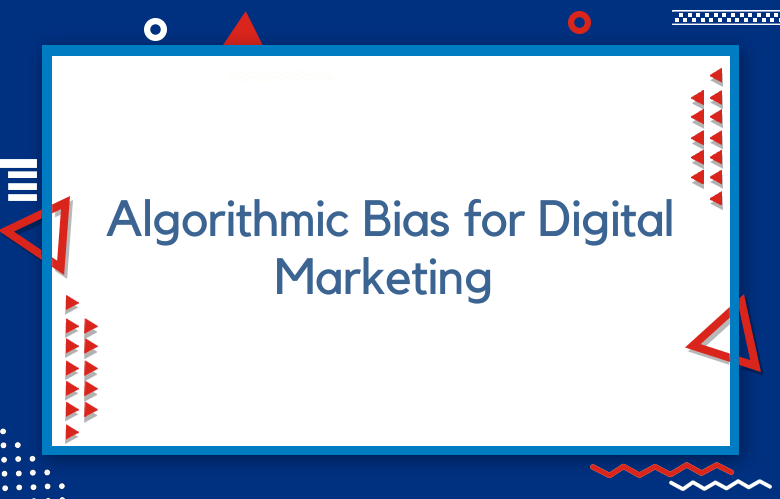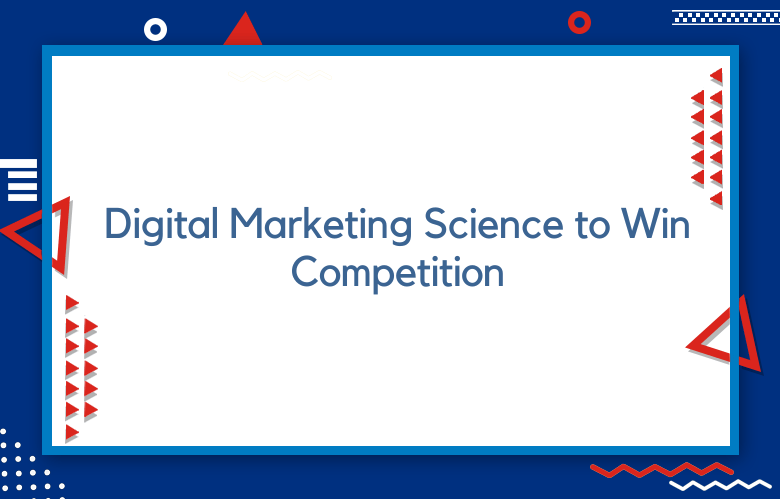Algorithmic Bias for Digital Marketing Unveiling Impactful Strategies

Algorithmic bias in digital marketing refers to unintended biases in AI and machine learning algorithms that can lead to skewed outcomes, favoring certain user groups over others. This bias often stems from the data on which the algorithms are trained, reflecting historical inequalities or incomplete representations of diverse user groups.
Algorithmic Bias for Digital Marketing Unveiling Impactful Strategies
In digital marketing, such biases can manifest in targeted advertising, content recommendation, customer segmentation, and predictive analytics, potentially leading to unfair treatment, misallocation of resources, and missed opportunities for engagement with diverse audiences.
Addressing algorithmic bias is crucial for developing fair, effective, and inclusive digital marketing strategies. Unveiling and mitigating these biases involve a deep dive into the data collection, model development, and decision-making processes, ensuring they are transparent, equitable, and reflective of the diverse consumer base that digital marketing campaigns aim to reach.
Strategies to combat algorithmic bias in digital marketing include:
Diverse Data Sets
Ensuring the data used to train algorithms is comprehensive and representative of all segments of the target audience to prevent biases based on gender, ethnicity, age, or other factors. Continuous Monitoring and Testing: Regularly audit algorithms for biased outcomes and adjust models as necessary to correct any imbalances.
Ethical AI Practices
Adopting AI ethics frameworks that guide the responsible development and deployment of AI technologies, emphasizing fairness, transparency, and accountability.
Stakeholder Involvement
Engaging a diverse group of stakeholders in the algorithm development process to provide varied perspectives and identify potential biases that might not be apparent to the development team.
By proactively addressing algorithmic bias, digital marketers can create more equitable and effective campaigns that resonate with a broad audience, enhancing customer experiences and fostering brand loyalty. This approach not only aligns with ethical standards but also opens up new market opportunities by reaching underserved segments and driving innovation and competitive advantage in the digital marketing landscape.
- Key Takeaways
- Unveiling Algorithmic Bias in Digital Marketing
- Impact of Behavioral Analytics on Strategies
- Privacy and Consent in a Digital Age
- Cookies and Their Role in Marketing Bias
- Social Media Algorithms and Audience Perception
- AI’s Influence on Content Creation
- Storytelling Science and Bias Mitigation
- Leveraging Data Analytics for Fair Marketing
- Strategies to Counteract Algorithmic Bias
- Summary
- Frequently Asked Questions
Did you know that algorithmic bias in digital marketing, driven by machine learning and automated decision intelligence systems, can significantly impact campaign performance due to human biases? Understanding algorithmic decision-making, algorithmic literacy, algorithmic design, and the potential biases they may exhibit is crucial for marketers striving to reach diverse audiences effectively. By uncovering and addressing algorithmic biases, including fairness and disparate impact, businesses can enhance their marketing strategies, improve customer engagement, and foster inclusivity while complying with nondiscrimination laws.
Key Takeaways
- Understanding algorithmic bias in digital marketing is crucial to ensure fair and equitable practices in reaching target audiences.
- Behavioral analytics can significantly impact marketing strategies, so it’s essential to review and adjust these approaches to mitigate bias regularly.
- Privacy and consent must be prioritized in the digital age to build trust with customers and respect their data rights.
- Cookies can contribute to marketing bias, so it’s important for marketers to be transparent about data collection and usage.
- Social media algorithms shape audience perception, emphasizing the need for marketers to be aware of potential biases and their effects.
- AI’s role in content creation requires careful monitoring to prevent perpetuating biases, necessitating ongoing evaluation and adjustments.
Unveiling Algorithmic Bias in Digital Marketing
Minority Communities
Machine learning algorithms and artificial intelligence used in digital marketing can inadvertently perpetuate algorithmic bias, leading to unintended consequences and disparate impact on minority communities. Biased search engine results may reinforce stereotypes, have disparate impact on race, or limit opportunities for these groups, with nondiscrimination consequences.
Lower-Income Exclusion
Automated decision systems, including machine learning and artificial intelligence, often exclude lower-income individuals through disparate impact from tailored marketing campaigns, further widening the digital divide. This exclusion, with its consequences, can prevent access to essential services or opportunities that could improve their quality of life.
Flawed Data and Digital Echo Chambers
Detecting and addressing algorithmic bias is crucial, as flawed data used to train these algorithms can create digital echo chambers. Such echo chambers restrict diverse perspectives, reinforcing existing beliefs and limiting exposure to new information.
Impact of Behavioral Analytics on Strategies
Leveraging Transparency
Transparency is critical to understanding how algorithms, artificial intelligence, and machine learning impact marketing strategies. By revealing the data sources influencing algorithms, marketers can assess potential biases effectively. Understanding the inner workings of algorithms enables organizations to make informed decisions based on accurate information.
Accountability plays a crucial role in ensuring ethical marketing practices. Marketers must hold themselves accountable for the outcomes of algorithmic impact assessments, fairness, decision-making, and research. This accountability fosters trust with consumers and demonstrates a commitment to fairness in digital marketing strategies and decision-making.
Incorporating Diverse Perspectives
Diversity in perspectives is essential for mitigating biases and discrimination in algorithmic decision-making processes and ensuring fairness in outcomes. By including individuals from various backgrounds, experiences, and groups, organizations can identify and address potential biases, discrimination, and fairness more effectively. Diverse teams bring unique insights that help create more inclusive and unbiased marketing strategies.
Pros
- Enhanced transparency leads to more informed decision-making.
- Accountability fosters trust and credibility with consumers.
- Diverse perspectives result in more inclusive and effective marketing strategies.
Cons
- Implementing transparency measures may require additional resources.
- Addressing biases through diverse perspectives can be challenging without proper training and support.
Privacy and Consent in a Digital Age
Data Collection
Digital marketing heavily relies on sensitive information to tailor advertisements to specific demographics. This practice raises concerns about transparency, fairness, and the protection of user privacy.
The use of personal data for targeted advertising has sparked debates around civil rights, fairness, and nondiscrimination. It’s crucial to navigate these ethical dilemmas with caution.
Implementing transparent data collection practices is essential for building trust with consumers in an online environment. Consumers are increasingly aware of the importance of safeguarding their personal information.
Regulatory Compliance
Ethical digital marketing strategies must ensure compliance with nondiscrimination laws, fairness, and prioritizing user consent. Companies must adhere to strict regulations to protect consumer rights.
Regulatory bodies play a vital role in monitoring digital marketing practices to prevent any misuse of personal information. Establishing clear guidelines helps maintain a level playing field for all organizations.
Accountability and Trust
Building accountability mechanisms into digital marketing processes fosters trust between companies and consumers. Transparency regarding data usage is critical to maintaining this trust.
Cookies and Their Role in Marketing Bias
Tracking Cookies
Cookies play a crucial role in perpetuating biases in digital marketing by tracking users’ online activities. These small pieces of data enable websites to remember users’ preferences and track their behavior.
Tracking cookies often leads to potential biases by reinforcing existing human biases. For example, if a consumer repeatedly visits certain websites or interacts with specific content, the algorithm may limit their exposure to diverse perspectives.
Exclusion and Limited Targeting
The reliance on cookie-based tracking can result in exclusion and limited targeting in digital marketing campaigns. When algorithms heavily rely on cookies, they tend to categorize individuals based on their online behavior, potentially overlooking other relevant factors.
This focus on cookies can inadvertently exclude certain groups or individuals from receiving tailored marketing messages. Moreover, sensitive attributes such as race, gender, or socioeconomic status can be used to target or exclude specific demographics.
Alternative Strategies for Inclusive Marketing
To combat the biases perpetuated by cookies in digital marketing algorithms, companies are exploring alternative strategies for more inclusive marketing campaigns. One approach is to prioritize first-party data collection directly from consumers rather than relying solely on third-party cookies.
By collecting data through direct interactions with consumers, companies can create more personalized and inclusive marketing strategies. This shift allows marketers to consider a broader range of factors beyond online behavior, leading to more diverse and targeted campaigns.
Embracing Diversity and Transparency
Inclusive marketing goes beyond just diversifying target audiences; it involves embracing diversity in all aspects of the marketing process. Companies can enhance transparency by clearly communicating how data is collected and used to ensure ethical practices.
Moreover, incorporating diverse perspectives within marketing teams can help identify and address biases early in the campaign development process. By fostering a culture of diversity and inclusion, companies can create more authentic connections with their audience.
Social Media Algorithms and Audience Perception
Echo Chambers
Social media algorithms play a pivotal role in shaping audience perceptions by curating content based on user interactions. This creates echo chambers, where individuals are exposed to information that aligns with their existing beliefs due to algorithms. The feedback loop of liking, sharing, and commenting reinforces these biases.
Impact on Bias
The unintended consequences of algorithmic content curation can perpetuate stereotypes and biases. For example, on platforms like Facebook, certain groups may be disproportionately shown content reinforcing gender stereotypes or other prejudices due to algorithms. This can lead to a skewed perception of reality and further divide society.
Diversifying Content Exposure
To combat algorithmic biases, stakeholders must measure to diversify content exposure. By consciously seeking out information from diverse sources and engaging with content that challenges preconceived notions, users can break free from the limitations imposed by algorithms.
Strategies for Inclusivity
Platforms must also prioritize inclusivity by actively promoting content from a wide range of creators representing different demographic groups and algorithms. By incorporating algorithms and mechanisms that highlight diverse perspectives and voices, social media can create a more inclusive online environment that fosters understanding and empathy.
AI’s Influence on Content Creation
Bias in AI Algorithms
AI models, powered by algorithms, have revolutionized content creation, yet they can inadvertently perpetuate biases. These biases stem from the data used to train the algorithms, reflecting societal prejudices. For instance, if historical data is biased, the AI model may produce discriminatory content.
Human Oversight for Fairness
Human oversight plays a crucial role in ensuring fair and inclusive content generation. While AI tools, including algorithms, can streamline processes, human intervention is essential to identify and rectify biases. By involving diverse teams in content creation, companies can mitigate algorithmic biases effectively.
Enhancing Creativity with AI Tools
Leveraging AI tools enables marketers to enhance creativity while mitigating algorithmic biases. Sentiment analysis and natural language processing allow marketers to effectively tailor content to diverse audiences. These tools offer insights into audience preferences, enabling personalized and engaging content creation.
Storytelling Science and Bias Mitigation
Importance of Mitigation
Bias impact statements are crucial in understanding the potential harms of algorithmic biases in digital marketing. Through mitigation proposals, companies can reduce the risks associated with biased algorithms.
Diverse narratives play a vital role in countering stereotypes. By incorporating varied perspectives, marketers can create more inclusive content that resonates with a broader audience.
Raising Awareness
Storytelling serves as a powerful tool for raising awareness about algorithmic biases. Research published in scholarly papers and journals highlights the significance of addressing bias in digital marketing strategies.
Incorporating stories of roundtable participants who have experienced the adverse effects of biased algorithms can shed light on the importance of implementing mitigation strategies.
Leveraging Technology
Technology plays a significant role in detecting and mitigating bias in marketing algorithms. By utilizing advanced tools and systems, companies can identify and rectify errors that may perpetuate discriminatory practices.
Text analysis tools, algorithms, and word recognition software can help marketers pinpoint instances of bias in their content. By leveraging these technologies, businesses can ensure that their marketing campaigns are inclusive and representative of diverse audiences.
Leveraging Data Analytics for Fair Marketing
Identifying Biases
Data analytics can uncover biases in training data used for digital marketing algorithms. By auditing historical data, marketers can ensure fairness.
Using deep learning, marketers can detect and address biases that may impact the accuracy of marketing campaigns.
Creating Inclusive Strategies
Big data enables marketers to analyze customer equity and develop targeted content for diverse markets. This helps in creating more inclusive marketing strategies.
By leveraging independent research, brands can gain insights into consumer behaviors and preferences, leading to more effective campaigns.
Optimizing Marketing Efforts
Marketers can utilize data analytics tools to optimize decision-making processes, ensuring that marketing efforts are tailored to specific audiences.
Implementing data-driven approaches allows for the identification of biases in marketing content, leading to more accurate and targeted campaigns.
Strategies to Counteract Algorithmic Bias
Implementing Counterfactual Reasoning
Counterfactual reasoning plays a crucial role in mitigating biases within algorithmic decision-making processes. By exploring alternative scenarios, organizations can identify and rectify potential biases in their algorithms. This method involves tweaking variables to understand how different inputs could lead to disparate outcomes. Through this approach, companies can enhance the fairness and accuracy of their algorithms, reducing the risk of perpetuating discriminatory practices.
Diversifying Data Science Teams
Diversifying data science teams is essential for combating algorithmic bias effectively. By bringing together individuals with diverse backgrounds and perspectives, organizations can increase their algorithmic bias management capabilities. Varied viewpoints enable more comprehensive bias detection, ensuring that algorithms are scrutinized from multiple angles. This diversity fosters an environment where potential biases, such as gender bias, are more likely to be identified and addressed promptly.
Developing Inclusive Marketing Strategies
Developing strategies for fair and inclusive digital marketing is paramount in addressing algorithmic bias. It involves creating marketing campaigns that resonate with diverse audiences while avoiding reinforcing stereotypes or promoting discriminatory content. Incorporating principles of algorithmic hygiene into marketing practices helps ensure that all consumers receive equitable treatment. By considering factors such as diversity and public policy recommendations, companies can minimize the likelihood of producing biased content or inadvertently discriminating against certain groups.
Summary
In the digital marketing realm, understanding algorithmic bias is crucial. It impacts strategies, audience perception, content creation, algorithms, and storytelling science. By recognizing biases and leveraging data analytics for fair marketing, you can counteract algorithmic bias effectively. Privacy and consent play a pivotal role in navigating the digital age, especially concerning cookies and their influence on marketing bias. With AI’s growing influence, being mindful of biases in algorithms becomes even more critical. Embracing strategies to mitigate bias ensures a more equitable and effective digital marketing landscape.
Take charge of your digital marketing efforts by implementing strategies that prioritize fairness and inclusivity. Stay informed about algorithmic bias trends and continuously assess your approaches to ensure ethical practices. By actively working to counteract biases, you contribute to a more transparent and trustworthy digital marketing environment.
Call: +91 9848321284
Email: [email protected]
Frequently Asked Questions
What is algorithmic bias in digital marketing?
Algorithmic bias in digital marketing refers to the prejudice or discrimination that can occur in automated decision-making systems used for targeting ads or content based on factors such as race, gender, or socio-economic status.
How can behavioral analytics impact digital marketing strategies?
Behavioral analytics can provide insights into consumer behavior patterns, preferences, and trends, enabling marketers to personalize campaigns, optimize targeting, and improve customer engagement for better ROI.
Why is privacy, accountability, and consent crucial in the digital age of marketing, especially with big data and potential harm from sensitive information?
Privacy and consent are essential to build trust with consumers. Respecting privacy regulations and obtaining ethical ethical consent not only protects user data but also enhances brand reputation and fosters long-term customer relationships.
What role do cookies play in marketing bias?
Cookies track user browsing behavior to personalize online experiences. However, reliance solely on cookies can lead to biased targeting and limit inclusivity. Marketers must balance personalization with diversity to avoid reinforcing biases.
How do social media algorithms influence audience perception?
Social media algorithms curate content based on user interactions, potentially creating filter bubbles or echo chambers. This algorithm impacts what users see, shaping their views and influencing decisions. Understanding these algorithms is crucial for marketers to reach diverse audiences effectively.



